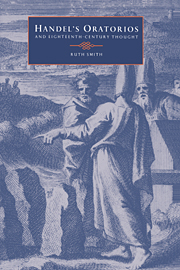Book contents
- Front Matter
- Contents
- Acknowledgements
- Abbreviations
- Introduction
- PART 1 ENGLISH ORIGINS OF ENGLISH ORATORIO
- Chapter 1 Artistic norms
- Chapter 2 The purpose of art
- Chapter 3 Music, morals and religion
- Chapter 4 The biblical sublime
- Chapter 5 The survival of epic
- Chapter 6 The defence of Christianity
- Chapter 7 Towards oratorio
- PART II THE PATRIOT LIBRETTO FROM THE EXCISE BILL TO THE JEW BILL: ISRAELITE ORATORIOS AND ENGLISH POLITICS
- Appendix I Libretto authors and sources
- Appendix 2 The oratorios and Methodism
- Notes
- Bibliography of sources cited
- Index
Chapter 6 - The defence of Christianity
Published online by Cambridge University Press: 22 September 2009
- Front Matter
- Contents
- Acknowledgements
- Abbreviations
- Introduction
- PART 1 ENGLISH ORIGINS OF ENGLISH ORATORIO
- Chapter 1 Artistic norms
- Chapter 2 The purpose of art
- Chapter 3 Music, morals and religion
- Chapter 4 The biblical sublime
- Chapter 5 The survival of epic
- Chapter 6 The defence of Christianity
- Chapter 7 Towards oratorio
- PART II THE PATRIOT LIBRETTO FROM THE EXCISE BILL TO THE JEW BILL: ISRAELITE ORATORIOS AND ENGLISH POLITICS
- Appendix I Libretto authors and sources
- Appendix 2 The oratorios and Methodism
- Notes
- Bibliography of sources cited
- Index
Summary
Can ye, ye deists, the Apostle hear
With thankless Ear?
Thomas Morell, The Christian's Epinikion (1743)THE SPREAD OF SCEPTICISM
Eighteenth-century Anglican teaching stressed good works more than faith. Ethical social benevolence is the road to salvation in countless sermons of the period by the latitudinarian Archbishop Tillotson, his clergy and their followers. In this neglect of the concept of original sin and emphasis on humanity's potential to fulfil the requirements of divine precepts in this life, Christianity relaxed its doctrine of redemption by grace further than in any previous period of English history. Some versions of religion, most influentially that of the third Earl of Shaftesbury, secularised ethics to the extent of suggesting that men and women did not need God to teach them perfection. At the same time, in France, Richard Simon initiated scholarly criticism of the text of the Bible, and a translation of his work (Critical History of the Old Testament, 1682) devastatingly undermined English Protestant faith in the integrity, inspiration and authority of Scripture. These were the intellectual seedbeds of the freethinking deist movement in England.
The greatest importance of the English deist controversy to the history of religion is that it gave rise to the major Anglican apologetics of the eighteenth century. Its importance to students of Handel's oratorios is that it helps to explain the librettos' content and gives us a further sense of the strength of their engagement with major concerns of their time.
- Type
- Chapter
- Information
- Handel's Oratorios and Eighteenth-Century Thought , pp. 141 - 156Publisher: Cambridge University PressPrint publication year: 1995

